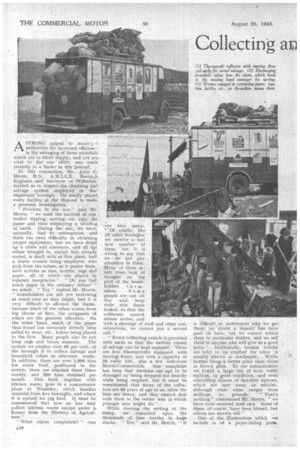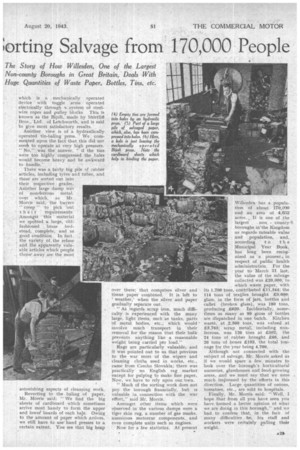Collecting aui ;orting Salvage from 170,000 People
Page 30

Page 31

If you've noticed an error in this article please click here to report it so we can fix it.
The Story of How Willesden, One of the Largest Non-county Boroughs in Great Britain: Deals With Huge Quantities of Waste Paper, Bottles, Tins, etc.
ASTRONG appeal •to muirc-1-71. authorities for increased efficienc-,
in the salvaging of those matenal3 which are in short supply, and yet are, vital to the war effort, was made recently in a leader in this journal.
In' this connection, Mr. John C.
Morris, B.Sc., Borou-_,h Engineer and Surveyor of Willesden. invited us to inspect the cleansing and salvage system employed in tha' important borough. He kindly placed every facility at ciur disposal to mak(
a personal investigation. • .
" Previous to the war," said MP Morris, " we used the method of con trolled tipping, sorting out only the paper and then employing a blinding of earth. During the war, 'we have, naturally, had to extemporize, and there has been difficulty in obtaining proper equipment, but we have fitted up a chute and conveyor, and all tile refuse brought in, except that already sorted, is dealt with at this plant, half a dozen women being employed, who pick from the refuse, as it passes them, such articles as tins, bottles, rags and paper, all of which are placed in separate receptacles." " Db you find much paper in the ordinary refuse? " we asked. " Yes," replied Mr. Morris, " householders are not yet exercising as much care as they might, but it is very difficult to allocate the blame, because much of the refuse comes from. big blocks of flats, the occupants of, which are the greatest offenders. On the other hand, much of the . paper thus found has obviously already been soiled by meat, etc., before being placed in the bins. Many people also do not keep rags and bones separate. The system we employ over 90 per cent, of the borough is to collect salvage and household refuse in alternate weeks. In addition,. there are over 1,000 bins fos waste food, positioned in the streets; these are emptied three times weekly, and 3,00 tons obtained per month. This food, together with kitchen waste, goes to a concentrator plant at Wembley, which handles material from five boroughs, and where it is cooked for pig food. It must be remembered that now no one may collect kitchen waste except under a licence from the Ministry of Agriculture."
" What about complaints? " was
Cynir next query. Of confle, like all other borcrughs, we receive a certain number of these, -but it is wrong to say that we ' do not pay attention tti them. Many of them result from lack of thought on the part of the householders _ them
selves. Some people are out all day and keep their side doors locked, so that the collectors cannot obtain access, and with a shortage of staff and other considerations, we cannot pay a second call."
" Every collecting vehicle is provided with sacks so that the various classes of salvage can be kept -separate. There are five Thornyerofts equipped with moving floors, and with a capacity of 20 cubic yds., also a few well-worn Morris-Commercials. One complaint has been that dustbins areapt to be damaged by being dropped too heavily while being emptied, but it must be remembered that many of the collectors are 60 years of age or so, often the bins are heavy, arid they cannot deal with them in the tender way in which younger men might do."
While Viewing the sorting at the dump, we remarked upon the thousands of beer bottles in huge stacks. " Yes," said Mr. Morris, " it is difficult to understand why we get them; no doubt a deposit has been paid on 'each: but we cannot return them to Particular dealers, and we sell them to anyone who will give us a good price." Incidentally, broken battles are sold to he crushed for what is usually known as sandpaper., White bottles bring a better price than thosein brown glass. To our astonishment we found a large bin of soda water siphons, in good condition, and even contairling dozens of Sparklet siphons, which are sent away as rubbish, although their value ranges from
shillings to pounds. " That's nothing," commented Mr. Morris, " we have even received used cars. Some of these, of course, have been blitzed, but others are merely old."
One of the illustrations which we include s of a paper-baling press,
which is a mechanically operated device • with toggle arms operated electrically through a system of steel • wire ropes and pulley blocks This is known as the Bijoli, maae by Shirtliff Bros., • Ltd.. of Letchworth, and is said to give most satisfattory results.
. Another view is of a hydraulically operated -tin-baling. press. We com • melted upon the fact that this did not seed.' to operate at very high pressure. "No," was the answer, " if the tins , were too highly compressed the bales would become heavy and be awkward to handle."
There was a fairly big pile -If rubber articles, including tyres and tithes, and • these are sorted out into their respective grades.
• Ada* large dump waS of nonzferrows metal, • over . which, as Mr...
• Morris said, 'the buyers " creep " to Pick out th eir requirements Athorigst this material we spOtted a large, oldfashioned brass bedstead, complete, and in
• 'good condition.. In 'fact, the 'variety of ,the refuse atid :the apparently Valu'able articles which'people throW• away are the. most
astonishing aspects of cleaning work. Reverting to the baling of Paper, Mr. Morris said: " We find the big • sheets of cardboard which sometimes arrive most bandy to forrh the upper and Iowa boards of each bale. Owing to the amount of paper which arrives, we still have to •use hand presses to a certain extent. You see that big heap over there; that comprises silver and tissue paper combined. It is left to ' weather,' when the silver and paper gradually separate out.
" A§ regards, scrap iron, much difficulty is experienced with the many large, light items, such as tanks, parts of •metal bodies, etc.; which would • involve much transport in their removal for the reason that their bulk• prevents anything like a reasonable weight. being carried per load."
Rags are particularly valuable, and it was pointed out to us that previous to the war most of the wipers and cleaning cloths used in works, etc., came from 0.eoho Slovakia; there was practically no English rag market except for pulping to make fine paper. Now, we have to rely upon oatiown.
" Much of the sorting work does not pay the borough financially, but is valuable in connection with the war effort," said Mr. Morris.• Amongst other items which were ohserved.in the various dumps were a tiger skin rug, a number of gas masks. numerous motorcar components. and even complete units such as engines.
Now for a few statistics. At present Willesdenhas a popula-. tines of .about 170,000 and an area of_ 4,6= acres... It is one of the largest nori county boroughs in the Kingdom as regards rateable value and population, and,, according t o t Li e Municipal Year Book, has long beets recog= nized as a pioneer, in respect of public health administratidn. For the.
yeat b..) March 81_ last,
the value of the salvage
collected was £20,000, to . which waste paper, with its 1,700 tons, contributed £11,344; the 114 tong of textiles brought £3,00.0; glass, in the form of jars, bottles and cutlet (broken glass), was 180 tons, producing £620. Incidentally, some-. times as many as 90 gross of bottles are dispatched ,in. one batch. Kitchen waste, at 2;500 tons, was valued at £3,765; scrap metal; including nonferrous, was 126 tons at £502; the 24 tons of rubber brought 266, and 26 tons of bones £103, the total tonnage for the year being 4,700.
Although not connected with the subject of salvage, Mr. Morris asked us if we would spare a few minutes to look over the borough's horticultural nurseries, glasshouses and, food-growing areas, and we must say that we were much impressed by the 'efforts in this direction. Large quantities of onions. tomatoes, etc., are sold to hospitals.
Finally, Mr, Morris said: " Well, I. hope that from all you have seen you have.-formed a better opinion of what we are doing in this borough," and we had to confess that, in the face of many difficulties he, his staff and workers were certainly pulling their weight.




















































